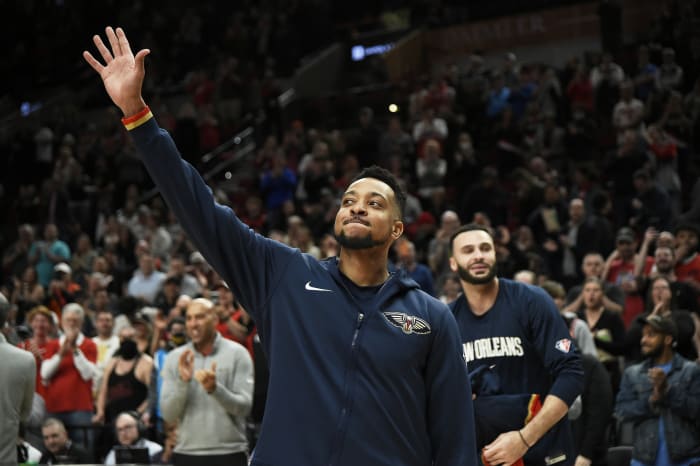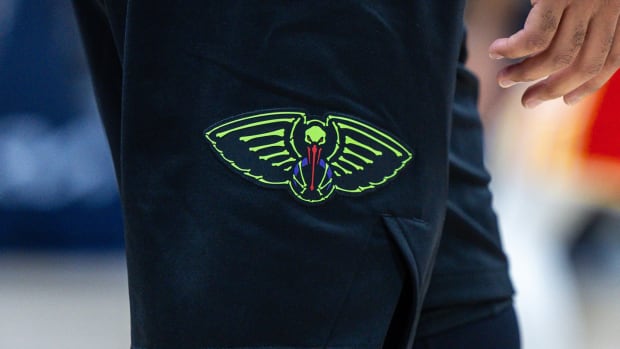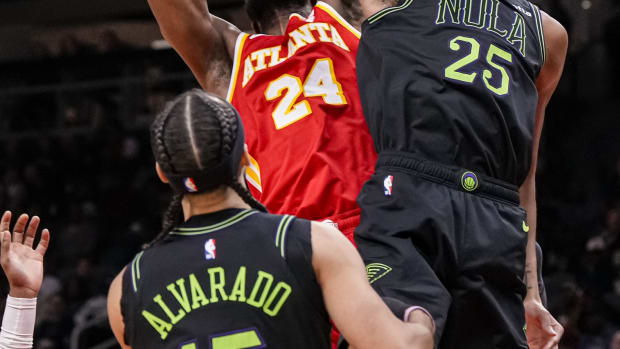Pelicans Finding New Investors Would Alleviate Luxury Tax Payments
NEW ORLEANS - Pelicans Governor Gayle Benson and her late husband Tom helped save professional basketball in New Orleans. For a franchise that has never crossed the luxury tax threshold, now it might be time to share the spoils a bit all things considered. As this championship-caliber roster starts getting expensive, the city's beloved billionaire could help alleviate some concerns by splitting the burdens of future luxury tax bills.
According to Forbes, Benson, the 15th wealthiest NBA owner, is worth $4.7 billion, a one-year increase of over 23%. Still, the COVID-19 pandemic shook up the economic landscape for everyone, regardless of financial status. For the NBA, it opened the door to several financial entities looking to invest in sporting properties.
But what are the options that actually fit Benson's vision for New Orleans and how will they help keep this current team together? Should more opinions be brought into the room to help with a luxury tax bill or will Benson trust the current front office and pay for this championship run out of her own pocket?
Owners and investors are playing things close to the vest and keeping comments off the record. However, a source close to the team admitted, along with every professional team in every sport, the Pelicans "are frequently approached by folks inquiring about minority interest."
Private Equity vs. SPACs
What are the options? A few deep-pocketed, well-connected special-purpose acquisition corporations (SPACs) are battling with countless private equity firms to capitalize on the sports market as customers have returned to arenas in full force.
The biggest difference for fans to focus on is private equity remains private at the whims of owners who might want to rebrand or relocate. SPACs are publicly traded, so more voices usually have to be considered to make big moves.
The most concerning aspect for the NBA is that SPAC ownership could lead to league financials being revealed via public filings. Currently, the only publicly traded NBA property is James Dolan's Madison Square Garden Sports-owned New York Knicks, which doesn't reveal the team's financials.
Another related issue raised was when the Golden State Warriors asked to sell a 5% stake to Arctos Sports Partners, which is now at 13% ownership as of December 2021. Letting these publicly traded entities invest in teams could artificially lower their values. Team valuations could be at the mercy of investors' whims, especially if SPAC ownership led to league financials disclosed via public filings.
SPACs are starting to slip behind due to those constraints and some disagreements with the NBA's by-laws on ownership rights. In July 2021, the NBA opened the door for private-equity firm Dyal Capital Partners to buy small minority stakes in NBA teams.
Dyal HomeCourt now has assets of $283 million, a 77% increase from what the fund held a year ago, and has already reached agreements with some owners. As of November 2022, Dyal is a part owner of the Atlanta Hawks, Phoenix Suns, and Sacramento Kings.
Benson, who sits on several boards and committees with the NBA and NFL, has the cache to push these types of deals with the NBA and potential investors even further. The success of this current squad might depend on it if she is intent on shying away from a large luxury tax bill. Bringing in new money would set a precedent but also could invite other problems.
Setting Precedents, Succeeding With Pelicans
More money might mean more problems, but no investment money could mean dwindling fan support. Inviting small-stakes shareholders and limited partners to come on board is becoming more of the norm, but the idea has not quite taken hold. Whichever ownership is able to set a precedent will have a head start in the new arms races.
The new CBA has two luxury tax lines, but the Pelicans have almost $100 million committed to the Big 3. Another set of deep pockets in New Orleans would be another voice, another investment in keeping this championship core together.
- Zion Williamson- $35 million
- Brandon Ingram- $34 million
- CJ McCollum- $33 million
- Herb Jones- eligible for a 4-year, $70 million extension
- Trey Murphy III- eligible for a 5-year deal next summer
- Cap Maximum: $134,000,000
- Luxury Tax Threshold: $162,000,000
The preference would be for private equity over publicly traded entities. The new NBA CBA benefits small-market teams in a few ways, but this foundation is already established. The margins on the salary cap are getting squeezed, though, which is something SPAC accountants would flag.
The New York Post reports various SPAC owners have contacted nearly every NBA owner in the past two years. Apparently, frustration appears to be building among some ownership groups over how slowly the NBA is working on a solution. Benson may want to speed things up for this supercharged (when healthy) roster.

Jun 23, 2022; Brooklyn, NY, USA; Dyson Daniels (G League Ignite) shakes hands with NBA commissioner Adam Silver after being selected as the number eight overall pick by the New Orleans Pelicans in the first round of the 2022 NBA Draft at Barclays Center. Mandatory Credit: Brad Penner-USA TODAY Sports
Major Money, Minority Investors, Mixed Results
The NBA's Advisory/Finance Committee has agreed to a framework whereby private equity funds and other institutional investors may own up to 20% of a single franchise. Those entities can also own shares in up to five teams.
The NBA is seemingly relaxing the rules because sky-high franchise valuations are pricing out even some of the wealthiest tech entrepreneurs. The average team is now estimated to be worth nearly $2.4 billion. Opening up the bidding to more potential buyers helps ensure further rises in team valuations.
This approach also offers limited partners a way of cashing in on their investments. And there is plenty of money to go around.
Arctos Sports Partners has reached $950 million in assets under management and has a partnership deal with Sportico. Goal Acquisitions, formed by NBA legend Michael Jordan's former agent David Falk, raised $225 million. However, there are cautionary tales with SPACs.
SportsTek Acquisition, founded by former Houston Astros General Manager Jeff Luhnow, raised over $150 million but had to "dissolve and liquidate" this past November. Sports Ventures Acquisition Corp. completed a $230 million IPO on January 6, 2021, but also had to shutter in December 2022.

Mar 30, 2022; Portland, Oregon, USA; New Orleans Pelicans guard CJ McCollum (3) waves to fans as he receives a standing ovation before a game against the Portland Trail Blazers at Moda Center. Mandatory Credit: Troy Wayrynen-USA TODAY Sports
Minority Owner Market Valuations
More than a few NBA franchises, from small-market San Antonio to the Golden State Goliath, are starting to look at assembling larger ownership groups while some early investors are looking to cash out. Arguably the greatest player of all time is no different, and the Pelicans will be affected by any future sale price.
Michael Jordan gradually assumed near-total control of Hornets Sports & Entertainment after purchasing the franchise in 2010. The first-ballot Hall of Famer added a pair of partners in 2019 and is now looking to sell a majority/controlling ownership in the team soon.
Jordan was "attracted to adding investors with deep resources who might offer new ideas regarding technology advances." Benson might be leaning toward that same conclusion as Pelicans Executive VP David Griffin alluded to a deeper investment into the analytical departments during exit interviews.
However, Benson's process could drastically differ from Jordan's, considering the succession plan that dictates how proceeds from the sale of the New Orleans Saints and New Orleans Pelicans will go to local charities. All purchase negotiations will seek to ensure both teams remain in the city.
Benson is under no pressure to cash out or give up control. New investors will likely pay less than the full market rate, as is typical with limited partners. She has to decide how much help will be needed.
The Bensons bought the team for $338 million. It is now worth over $1.6 billion. Investment groups do not pay premiums for non-controlling, silent stakes. Still, selling a 5% stake would likely fetch between $65-$80 million, according to several league sources familiar with these investments.
Granted, this money would not all go towards roster upgrades and luxury tax bills, but it would signal the fans that everything is being done to build a winning team. Someone willing to pay the luxury tax to ensure deep playoff runs for a few years.
Benson may want to keep control and have other voices speaking for the organization. However, even a small investment would be a positive signal to the fans for a franchise facing another offseason of skepticism, injury worries, and questions about bankrupt broadcast partners.






